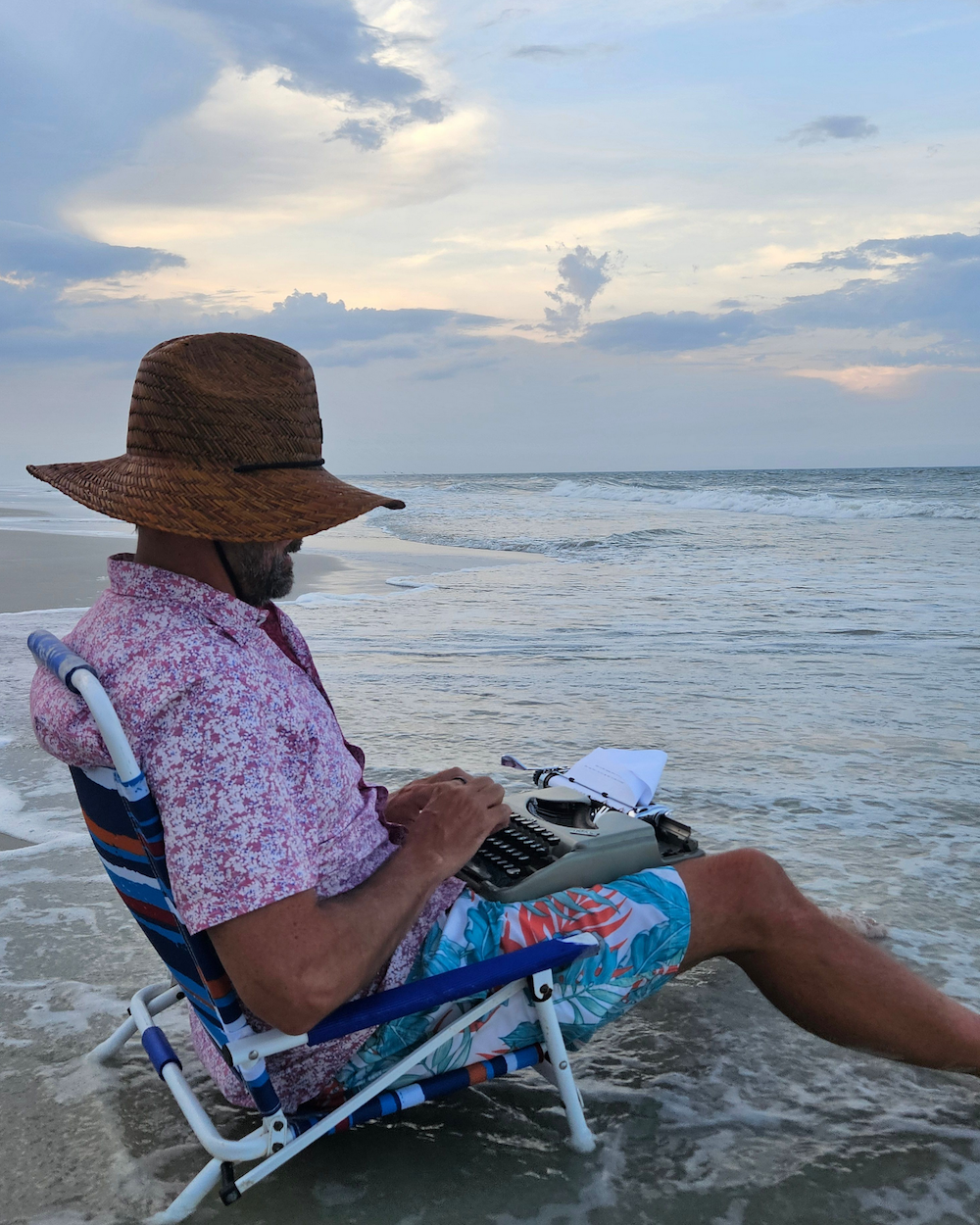The Classic Typewriter Story…
I believe that typewriters can change the world.
A typewriter really is the ultimate writing tool… or I was born in the wrong century!
I started using a typewriter in 2002. I was attending SFAI for an MFA in painting when my first typewriter came to my shoe-box-ish studio apartment. It was a Smith Corona Silent from the 30’s.
I fell in love. Not with a machine, but with my own writing process, and with life itself.
I know what some people are thinking…
Yeah yeah, you’re exaggerating.
And…
Writing was hard enough already… why render it nearly impossible!?
I was spellbound by the letters hammering my thoughts onto the paper in the same millisecond that I tapped the key. But after a page or so; a page riddled with errors, my fingers were sore. After twenty pages, my forearms were sore.
I had to unlearn computer typing mechanics.
I was astonished to discover that …. I’d forgotten to spell (thanks Spellchecker). I’d forgotten how to think (thanks Google).
I have no doubt that the typewriter is the ultimate writing machine. The computer is the ultimate research machine. With its litany of available distractions, one could argue that the quality of writing has actually declined in the digital age, alongside the quality of human connection.
I can’t tell you how often I’ve sent a typewritten letter to a swooning recipient; thrown in a pressed flower or an ink sketch. And they’ve written back how much they loved it, or how creative it made them feel.
I’m entrepreneurial by nature. I sold my first drawing when I was 7. I’ve written various books on and off of these beloved machines, some of which appear on Amazon, and I operate a few other businesses, including Budden: An Existential Detective Agency.
Classic Typewriter is mainly a labor of love; a way to spread my passion for these addictive contraptions.
I’m also a revolutionary at heart. When I hear the clack, I feel the call. There is something quintessentially radical in using a typewriter.
I don’t know exactly what it is, but returning to technologies designed to last a lifetime in the midst of a throwaway society constitutes a revolutionary act.
Witnessing letters form on the page instantly after years of ethereal, digital acts is still breathtaking.
My children use typewriters. (Here is a picture of one of them getting her hands on an Olivetti Lettera 32…)
I love to introduce these forgotten technologies to writers and future-writers (children).
When you need a tool that serves you, rather than throwing you into an endless pit of distraction.
When you’re in the middle of nowhere and inspiration strikes.
When there isn’t a charger for a thousand miles (one client lugged a Remington 5 out into the Desert of Egypt to write).
Sometimes you want to lug a machine to a cabin in the mountains and pen your life story. Or follow Mary Oliver’s trend into the trees.
You deserve a lifetime companion in this writing journey.
The Art of Vintage
For many storytellers, there was a golden era of writing. Our favorite novelists pounded out their masterpieces on masterpieces of design and engineering; typewriters. Though they’ve fallen by the wayside, it wasn’t entirely because a better writing tool was invented, but simply due to the evolution of technology.
Many of these machines, even those built 50 or one hundred years, old are still in use throughout the world; still going strong. They’re used in courtrooms, classrooms, art studios, wilderness retreats, offices, etc.
Some of them survived literal wars, while soldiers cranked out words from the front. Other survived the war with the demon, procrastination. They’ve often survived epic journeys across deserts and oceans.
I've curated history's best typewriters; and by best I mean most useable, most beautiful, and most reliable.
My focus is typewriters for writers. Typewriters also make a choice piece of decor, if that’s your path. I love to look at them, it’s true. But the reason I love to look at them is because of what they are capable of: WRITING.
A typewriter may not instantly make you a better writer. It will help you refine your craft over time. Not only the craft of writing, but the process of thinking.
When I gaze at the 1937 Smith Corona Sterling on my bookshelf, I’m inspired. I crave the clack of the thing, hammering out words across a freshly pressed sheet of paper. I write until the writing is done, then I gather the manuscript up in a bundle, and read it later.
The founder in the old cabin of lore. Circa 1915.
I've learned to think more logically, and to express an argument more succinctly. I've published some of my poetry on instagram, in photographic form, still hanging out of the machine.
Is it any accident that most of the best literature of the 20th century was written on a typewriter? Often one of the very same models I offer here. Thomas Pynchon, arguably one of the best novelists alive, Cormac Mcarthy, and Woody Allen, Quentin Tarantino, and many others still compose or draft exclusively on typewriters.
My one caveat would be this: find a machine, and use it. I know I probably shouldn’t tell you this, as a typewriter dealer, but carrying consumerism into the typewriter world is ok, except you can take any typewriter on this site, and write your new world into being with it. That’s a guarantee. Other facts and features are just the incidentals.
Thank you for being here, among like minds. If you love words, you're in the right place.
Welcome to the written rapture.
Write on,
Steven Budden Jr. | Chapel Hill, NC - formerly of Northern California redwoods.
-Recoverer of Rare Antiquities / Writer / Typewriter Revolutionizer
Steven Budden, Writer, Classic Typewriter Owner, Technician of Ecstasy
Songs in the key of ‘Atlantic’


















